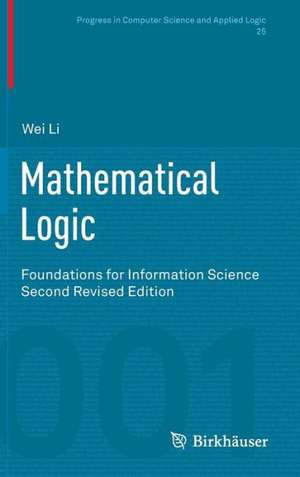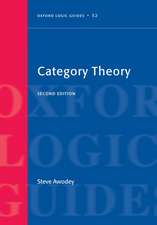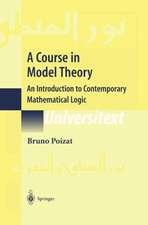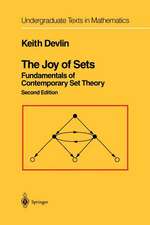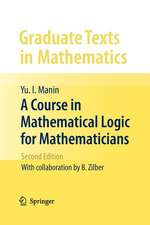Mathematical Logic: Foundations for Information Science: Progress in Computer Science and Applied Logic, cartea 25
Autor Wei Lien Limba Engleză Hardback – 24 noi 2014
The second edition of the book includes major revisions on the proof of the completeness theorem of the Gentzen system and new contents on the logic of scientific discovery, R-calculus without cut, and the operational semantics of program debugging.
This book represents a valuable reference for graduate and undergraduate students and researchers in mathematics, information science and technology, and other relevant areas of natural sciences. Its first five chapters serve as an undergraduate text in mathematical logic and the last five chapters are addressed to graduate students inrelevant disciplines.
Din seria Progress in Computer Science and Applied Logic
- 20%
 Preț: 342.78 lei
Preț: 342.78 lei -
 Preț: 380.25 lei
Preț: 380.25 lei - 20%
 Preț: 333.54 lei
Preț: 333.54 lei - 20%
 Preț: 1020.33 lei
Preț: 1020.33 lei - 15%
 Preț: 591.29 lei
Preț: 591.29 lei - 20%
 Preț: 340.49 lei
Preț: 340.49 lei - 20%
 Preț: 611.79 lei
Preț: 611.79 lei - 20%
 Preț: 334.71 lei
Preț: 334.71 lei - 20%
 Preț: 655.85 lei
Preț: 655.85 lei -
 Preț: 387.75 lei
Preț: 387.75 lei - 15%
 Preț: 588.04 lei
Preț: 588.04 lei - 20%
 Preț: 586.71 lei
Preț: 586.71 lei - 20%
 Preț: 474.87 lei
Preț: 474.87 lei -
 Preț: 410.88 lei
Preț: 410.88 lei -
 Preț: 393.74 lei
Preț: 393.74 lei -
 Preț: 403.75 lei
Preț: 403.75 lei - 15%
 Preț: 646.75 lei
Preț: 646.75 lei - 15%
 Preț: 646.43 lei
Preț: 646.43 lei - 20%
 Preț: 646.80 lei
Preț: 646.80 lei - 15%
 Preț: 698.94 lei
Preț: 698.94 lei - 15%
 Preț: 653.79 lei
Preț: 653.79 lei - 18%
 Preț: 730.79 lei
Preț: 730.79 lei -
 Preț: 399.29 lei
Preț: 399.29 lei - 20%
 Preț: 420.91 lei
Preț: 420.91 lei - 20%
 Preț: 335.03 lei
Preț: 335.03 lei -
 Preț: 379.86 lei
Preț: 379.86 lei -
 Preț: 381.00 lei
Preț: 381.00 lei - 20%
 Preț: 334.86 lei
Preț: 334.86 lei
Preț: 339.66 lei
Preț vechi: 424.58 lei
-20% Nou
Puncte Express: 509
Preț estimativ în valută:
64.99€ • 68.03$ • 54.10£
64.99€ • 68.03$ • 54.10£
Carte tipărită la comandă
Livrare economică 31 martie-14 aprilie
Preluare comenzi: 021 569.72.76
Specificații
ISBN-13: 9783034808613
ISBN-10: 3034808615
Pagini: 301
Ilustrații: XIV, 301 p. 13 illus.
Dimensiuni: 155 x 235 x 24 mm
Greutate: 0.62 kg
Ediția:2nd ed. 2014
Editura: Springer
Colecția Birkhäuser
Seria Progress in Computer Science and Applied Logic
Locul publicării:Basel, Switzerland
ISBN-10: 3034808615
Pagini: 301
Ilustrații: XIV, 301 p. 13 illus.
Dimensiuni: 155 x 235 x 24 mm
Greutate: 0.62 kg
Ediția:2nd ed. 2014
Editura: Springer
Colecția Birkhäuser
Seria Progress in Computer Science and Applied Logic
Locul publicării:Basel, Switzerland
Public țintă
GraduateCuprins
Preface.- Preface to the Second Edition.- I Elements of Mathematical Logic.- 1 Syntax of First-Order Languages.- 2 Models of First-Order Languages.- 3 Formal Inference Systems.- 4 Computability & Representability.- 5 Gödel Theorems.- II Logical Framework of Scientific Discovery.- 6 Sequences of Formal Theories.- 7 Revision Calculus.- 8 Version Sequences.- 9 Inductive Inference.- 10 Meta-Language Environments.- Appendix 1 Sets and Maps.- Appendix 2 Proof of the Representability Theorem.- Bibliography.- Index.
Notă biografică
Wei Li is Professor at the School of Computer Science and Engineering and Director of the National Laboratory of Software Development Environment at Beihang University in Beijing, China.
Textul de pe ultima copertă
Mathematical logic is a branch of mathematics that takes axiom systems and mathematical proofs as its objects of study. This book shows how it can also provide a foundation for the development of information science and technology. The first five chapters systematically present the core topics of classical mathematical logic, including the syntax and models of first-order languages, formal inference systems, computability and representability, and Gödel’s theorems. The last five chapters present extensions and developments of classical mathematical logic, particularly the concepts of version sequences of formal theories and their limits, the system of revision calculus, proschemes (formal descriptions of proof methods and strategies) and their properties, and the theory of inductive inference. All of these themes contribute to a formal theory of axiomatization and its application to the process of developing information technology and scientific theories. The book also describes the paradigm of three kinds of language environments for theories and it presents the basic properties required of a meta-language environment. Finally, the book brings these themes together by describing a workflow for scientific research in the information era in which formal methods, interactive software and human invention are all used to their advantage.
The second edition of the book includes major revisions on the proof of the completeness theorem of the Gentzen system and new contents on the logic of scientific discovery, R-calculus without cut, and the operational semantics of program debugging.
This book represents a valuable reference for graduate and undergraduate students and researchers in mathematics, information science and technology, and other relevant areas of natural sciences. Its first five chapters serve as an undergraduate text in mathematical logic and the last five chapters are addressed to graduate students in relevantdisciplines.
The second edition of the book includes major revisions on the proof of the completeness theorem of the Gentzen system and new contents on the logic of scientific discovery, R-calculus without cut, and the operational semantics of program debugging.
This book represents a valuable reference for graduate and undergraduate students and researchers in mathematics, information science and technology, and other relevant areas of natural sciences. Its first five chapters serve as an undergraduate text in mathematical logic and the last five chapters are addressed to graduate students in relevantdisciplines.
Caracteristici
A research monograph with a textbook style, well-structured and providing concrete illustrative examples as well as formal proofs for all theoretical results New ideas and methodologies from information science and technology are used to annotate the concepts and theorems of mathematical logic Provides a new angle of view for mathematicians and a friendly environment for information scientists to understand the quintessence of mathematical logic The author's original work on version sequences, revision calculus, and language environments is coherently integrated into the book
